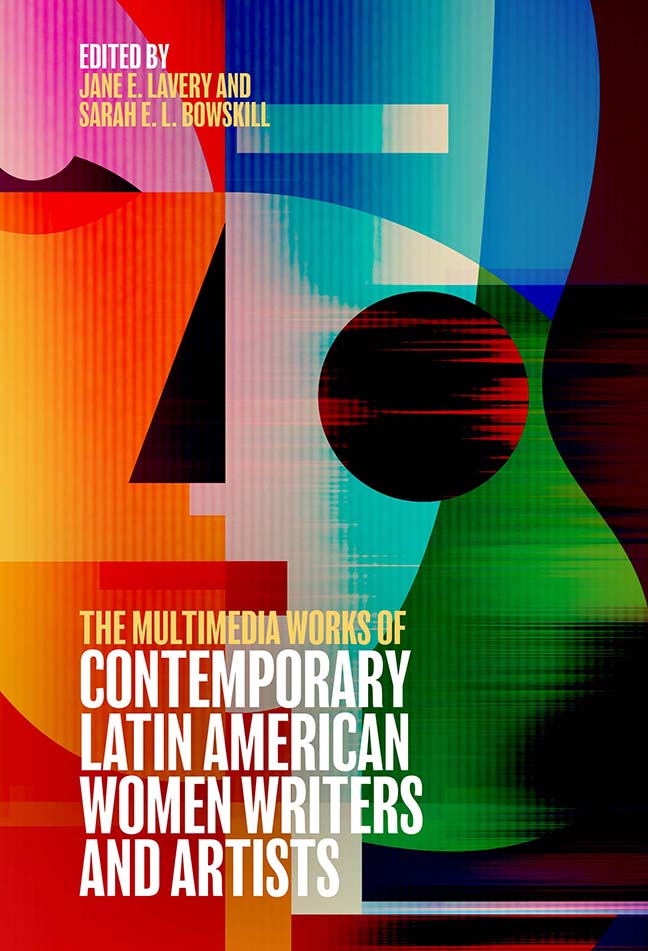Book contents
- Frontmatter
- Contents
- List of Illustrations
- List of Contributors
- Acknowledgments
- Introduction: A Crosscurrent of Contemporary Latin American Women Multimedia Writers and Artists
- 1 The Transliterary: The Novel and Other Multimedia Horizons Beyond (and Close to) the Textual
- 2 Commentary on Fe/males: Sieges of the Post Human (Transmedia Installation)
- 3 An Anthropophagic Ch’ixi Poetics
- 4 My Relationship with Artistic Creation Began with Words
- 5 Imagetext
- 6 Voices/Bodies
- 7 Redefining Meaning: The Interweaving of the Visual and Poetic
- 8 The Territory Is Home
- 9 Reflections on a Multimedia Practice
- 10 Digital Weaving
- 11 Eli Neira, Regina José Galindo, and Ana Clavel: “Polluting” Corporealities and Intermedial/Transliterary Crossings
- 12 The Digital Condition: Subjectivity and Aesthetics in “Fe/males” by Eugenia Prado Bassi
- 13 The Transmedia, Post-Medium, Postnational, and Nomadic Projects of Pilar Acevedo, Rocío Cerón, and Mónica Nepote
- 14 The Art of the Hack: Poets Carla Faesler and Mónica Nepote and Booktuber Fátima Orozco
- 15 The Places of Pain: Intermedial Mode and Meaning in Via Corporis by Pura López Colomé and Geografía del dolor by Mónica González
- 16 Words, Memory, and Space in Intermedial Works by Gabriela Golder and Mariela Yeregui
- 17 Fungibility and the Intermedial Poem: Ana María Uribe, Belén Gache, and Karen Villeda
- 18 Hypertext and Biculturality in Two Autobiographical Hypermedia Works by Latina Artists Lucia Grossberger Morales and Jacalyn Lopez Garcia
- 19 Dialogues Across Media: The Creation of (New?) Hybrid Genres by Belén Gache and Marina Zerbarini
- Bibliography
- Index
- Tamesis
17 - Fungibility and the Intermedial Poem: Ana María Uribe, Belén Gache, and Karen Villeda
Published online by Cambridge University Press: 17 December 2023
- Frontmatter
- Contents
- List of Illustrations
- List of Contributors
- Acknowledgments
- Introduction: A Crosscurrent of Contemporary Latin American Women Multimedia Writers and Artists
- 1 The Transliterary: The Novel and Other Multimedia Horizons Beyond (and Close to) the Textual
- 2 Commentary on Fe/males: Sieges of the Post Human (Transmedia Installation)
- 3 An Anthropophagic Ch’ixi Poetics
- 4 My Relationship with Artistic Creation Began with Words
- 5 Imagetext
- 6 Voices/Bodies
- 7 Redefining Meaning: The Interweaving of the Visual and Poetic
- 8 The Territory Is Home
- 9 Reflections on a Multimedia Practice
- 10 Digital Weaving
- 11 Eli Neira, Regina José Galindo, and Ana Clavel: “Polluting” Corporealities and Intermedial/Transliterary Crossings
- 12 The Digital Condition: Subjectivity and Aesthetics in “Fe/males” by Eugenia Prado Bassi
- 13 The Transmedia, Post-Medium, Postnational, and Nomadic Projects of Pilar Acevedo, Rocío Cerón, and Mónica Nepote
- 14 The Art of the Hack: Poets Carla Faesler and Mónica Nepote and Booktuber Fátima Orozco
- 15 The Places of Pain: Intermedial Mode and Meaning in Via Corporis by Pura López Colomé and Geografía del dolor by Mónica González
- 16 Words, Memory, and Space in Intermedial Works by Gabriela Golder and Mariela Yeregui
- 17 Fungibility and the Intermedial Poem: Ana María Uribe, Belén Gache, and Karen Villeda
- 18 Hypertext and Biculturality in Two Autobiographical Hypermedia Works by Latina Artists Lucia Grossberger Morales and Jacalyn Lopez Garcia
- 19 Dialogues Across Media: The Creation of (New?) Hybrid Genres by Belén Gache and Marina Zerbarini
- Bibliography
- Index
- Tamesis
Summary
By calling the letter “h” a centaur, Ana María Uribe (Argentina, 1944–2004) evokes the shape of that animal, while the sizes of the letters mimic depth, and their movement across our computer screen in various iterations suggests the majestic travels of a herd across a barren landscape. In another of her series of “Anipoemas,” one called “Gymnasium,” the “P” stretches itself into an “R” or “I” leaps into a “T” or an “X”; circus jugglers are mimicked by two lower case “i”s exchanging their dots. Spring and winter are evoked by lower case “q” and “p” climbing into each other, then losing their bumps. Belén Gache's (Argentina-Spain, 1960) “Veintidos mariposas rosas” (“Twenty-Two Pink Butterflies” which, indeed, includes twenty-two pink and one blue butterfly) invites the reader to click on butterflies, which flap their way off the page, taking the letter associated with their position with them, and leaving us with a new poem, legible or not. Karen Villeda's (Mexico, 1985) “Poetuitéame” (Poetweetme) gathers reader tweets by way of selected hashtags and converts them into something like cluster poems. Basia Irland (United States, 1946) has a series of mysterious “hydrolibros” created out of rescued ruined paper volumes, or carved out of wood, and another series of “ice books,” seeded and released into waterways, evanescent sculptures that may mimic text, but do not contain any words: “a lyrical and ecological poetry,” says Lynne Cline on Irland's webpage (https://www.basiairland.com/projects/hydrolibros/index.html).
All of these multimedia pieces call themselves poetry, but it is certainly not poetry as we understand it following the most traditional and minimal of definitions: a rhythmical composition, written or spoken, expressed in imaginative words. What they have in common is a focus on some kind of animation and/or interaction, a commitment to some version of rhythm, and a location on the Internet. In this chapter, I want to look at writers/performers/poets like these, by way of a few examples of Latin American intermedial1 artistic practice that is generally still called “poetry,” but which puts pressure on even the most expanded definitions of the genre.
- Type
- Chapter
- Information
- Publisher: Boydell & BrewerPrint publication year: 2023



